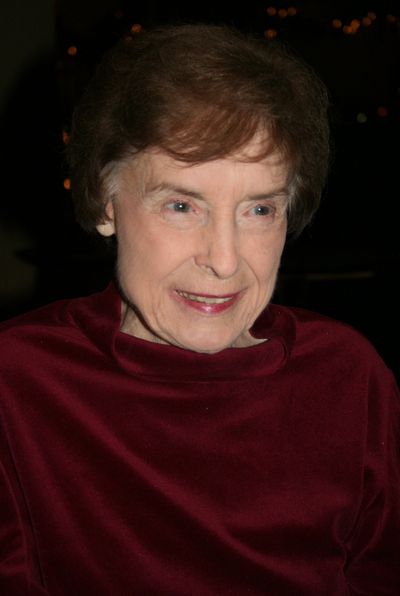This column reflects the opinion of the writer. Learn about the differences between a news story and an opinion column.
Shawn Vestal: Mary Higgins was matriarch, mental health care pioneer

Like a lot of families, there were political differences around the table when Mary Higgins and her clan sat down to dinner.
Instead of avoiding them, Higgins embraced them. She loved to talk about God, family and country, and relished teaching her children to make disagreement not so disagreeable.
“She taught us to gain perspective from others’ opinions,” said her son Dan Higgins, of Spokane. “She taught us not to judge each other. She taught us to learn from each other. … You just couldn’t go wrong in this family. You couldn’t walk out all mad at each other. She had a way to find a common thread.”
Higgins died Sunday at age 83, not quite two weeks after suffering a stroke. Her public legacy in Spokane is massive and impressive: For nearly a quarter-century at the head of Spokane Mental Health Center, she led the way in expanding crucial services for people with mental illness, picking up seemingly every civic award along the way. And yet it was her human, personal touch that lingers in the minds of her family and others who knew her.
“She was a hugely talented woman who stayed in the background and put everyone else in the foreground,” said daughter Maureen Higgins, who lives in Sacramento. “She won so many civic awards and so many accolades, which didn’t matter to her. What mattered to her was bringing new services to people who needed them.”
Higgins’ impact on mental health care in Spokane would be difficult to exaggerate. She oversaw mental health services during a time of massive change, as the nonprofit SMHC grew to become the largest community mental health center in the state. In the early ’70s, the widespread involuntary institutionalization of people with mental illness was coming to an end, and a dawning respect for their individual rights was taking hold. In that environment, Higgins led an agency that developed a wide range of services for people living in the community, a wholesale rethinking of the approach.
“Of central importance to her is the care of the mentally ill, the underserved mentally ill,” said Dr. Tad Patterson, a psychiatrist whom Higgins hired and who worked with her for 13 years. “It was her passion to do the best for them that she could.”
Born in Boise, Higgins moved a lot with her family, and her father ran drugstores. She attended nursing school at Sacred Heart School of Nursing, where she met Dr. Curran Higgins; the two were married for 59 years and raised a family of six children. He died about three years ago.
They moved to Spokane for good in 1958. After several years as a stay-at-home mom, Higgins went back to work in nursing. In 1970, she started at the mental health center; a year later, she was hired as the director, winning the job over several male candidates with doctorates, her family said.
At that time, the agency had seven employees. It provided three services: youth counseling, a crisis line, and services for patients being released from Eastern State Hospital, said Jeff Thomas, CEO of Frontier Behavioral Health, which now provides mental health care in the county.
Over the subsequent years, the organization grew dramatically; today it has 525 employees and an annual budget of nearly $45 million, Thomas said. Higgins oversaw the development of many innovative programs that reshaped and expanded the way people with mental illness were served. An elder services program focused on home visits for homebound older people and helped train others, such as mail carriers, in how to spot the signs that someone might need such care. On her watch, programs were created that helped people with mental illness recover and get back to work, provided crisis and emergency care, and targeted the particular needs of families and children.
Patterson said Higgins worked hard to advocate for the mentally ill and was “aggressive at times” on their behalf. Maureen Higgins said, “She was a visionary. She had a plan and she didn’t let anyone get in her way.”
The Mary Higgins Award is now the top honor awarded each year by the Washington Community Mental Health Council. Another award commemorates a sad occasion in Higgins’ life: Her daughter Michelle died in a car accident in 1978 at age 24. Mary Higgins created the Michelle Higgins Memorial Fund to bolster mental health services.
She retired in 1994 at age 65. In retirement, she loved to be surrounded by – and to feed – her family. She had 12 grandchildren and six great-grandchildren, “and she knew everything about their lives,” Maureen Higgins said. Mary and Curran traveled and enjoyed a lot of time together.
“Her best times were watching ‘Frasier’ with Dad,” Dan Higgins said.
She suffered a stroke on New Year’s Day. She spent her final days surrounded by family and loved ones, watching Gonzaga basketball and interacting with others.
“She never stopped communicating,” Maureen Higgins said. “It’s amazing what an eye roll or a frowny face or a smile can do.”
